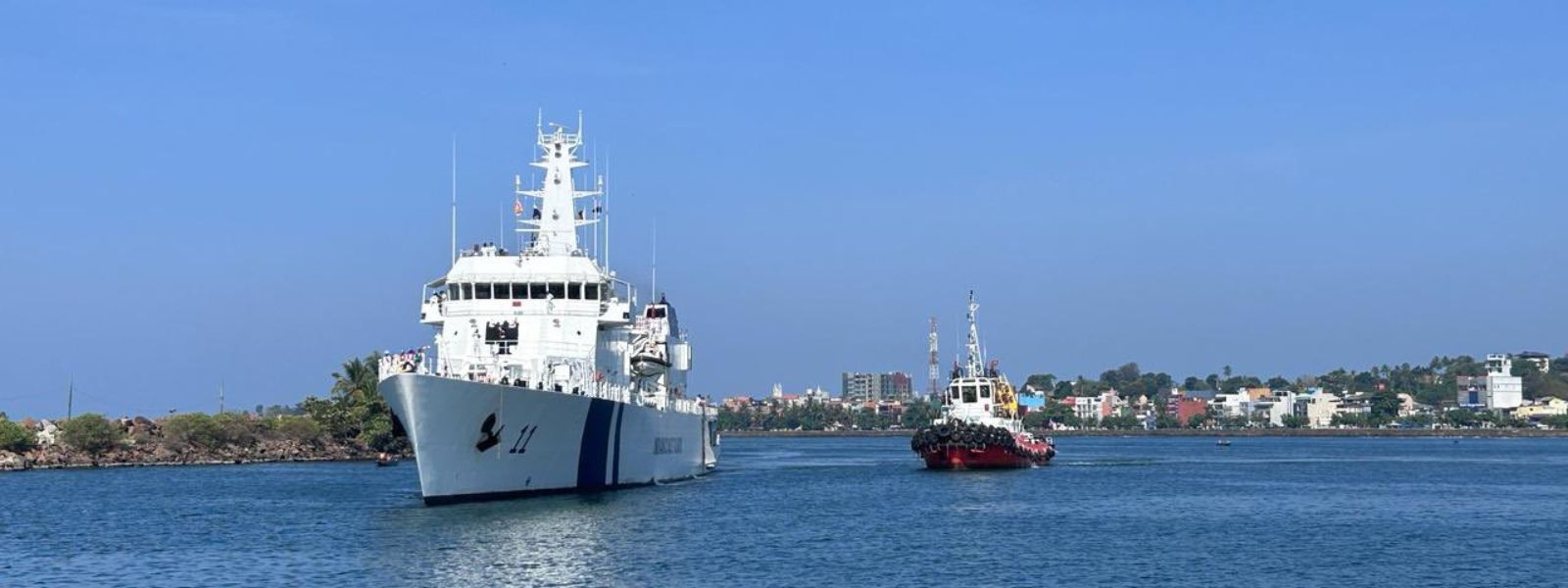.webp)

Indian Coast Guard Ships in Galle After Dosti Exercise in Maldives
COLOMBO (News 1st); Two Indian Coast Guard vessels reached the Galle Port on Wednesday (28) following the completion of trilateral maritime exercise "Dosti," hosted by the Maldives National Defence Force.
According to the Indian High Commission in Colombo the ICG ships are visiting Sri Lanka for training and professional interaction with the Sri Lanka Coast Guard to enhance interoperability and camaraderie.
The ships will stay till 01 March 2024 and then visit Colombo from 02-05 March 2024 before departing the Island.
During the stay, the ships will undertake training for Sri Lanka Coast Guard on VBSS, Fire Fighting and Damage Control, Maritime Pollution Response and hold few other professional interactions. Further, activities such as yoga, beach cleaning and walkathon will also be held during the visit. In addition, Passage Exercise (PASSEX) will be conducted with Sri Lanka Coast Guard Ship, on departure, off Galle and Colombo.
The visit of these Indian Coast Guard Ships will significantly aid in augmenting capabilities of Sri Lanka Coast Guard and personnel in order to efficiently address maritime security challenges in the region, said the Indian High Commission.
Indian Naval Ships and Submarines Kora, Kabra and Karanj had visited Colombo in past few months.
The 16th edition of the trilateral maritime exercise "Dosti," hosted by the Maldives National Defence Force (MNDF), got underway last week with a combination of intensive drills and training sessions.
The biennial exercise, held from February 22nd to 25th, witnessed the the participation of coast guard vessels from India, navy vessel from Sri Lanka, and the Maldives, along with observers from Bangladesh.
Indian Coast Guard Ship Samarth with integral helicopter and Abhinav entered Male to participate in the 16th edition of Exercise DOSTI. In addition, ICG Dornier also reached Male for the exercise.
Sri Lanka Naval Ship (SLNS) Samudura was also in the Maldives to take part in Exercise Dosti – XVI.
The exercise took place amidst heightened regional tensions, particularly between India and China, especially after the movement of the Chinese research vessel Xiang Yang Hong 3.
Following its denial of entry into Sri Lanka's Exclusive Economic Zone, the Chinese research vessel Xiang Yang Hong 3 reached the Maldives on Thursday (22)
The arrival of the Xiang Yang Hong 3 has added a new dimension to the ongoing diplomatic tensions between India and China regarding Sri Lanka.
India has expressed concerns about the repeated presence of Chinese research vessels in Sri Lankan waters, alleging potential security threats and dual-purpose data collection for both civilian and military activities, including submarine navigation.
In response to these concerns, the Sri Lankan government imposed a one-year ban on all research vessels conducting activities within its territorial waters.
However, the Chinese government had previously requested permission for the Xiang Yang Hong 3 to conduct inspections in Sri Lankan waters before the ban was implemented.
This request coincided with the preparation of the vessel for its voyage to the Indian Ocean.
With the ban in place, the Xiang Yang Hong 3, which had departed the Chinese port of Sanya on January 16th, diverted to the Maldives instead of Sri Lanka.
While initially announcing an arrival date of February 8th in the Maldives, the vessel reportedly engaged in research or survery activities near the Sri Lankan maritime border.
The exclusive economic zone (EEZ) of Sri Lanka extends 200 nautical miles from its southern coast. The Xiang Yang Hong 3 reportedly operated outside this zone during its activities near Sri Lanka.
Indian media sources have interpreted the Sri Lankan ban and the arrival of an Indian submarine in Colombo as a victory for India.
Chinese media, on the other hand, have characterized Indian pressure on Sri Lanka as a shameful act.
The Maldivian government clarified that the Xiang Yang Hong 3 is not conducting research activities within their territorial waters and is solely present for logistical purposes.
Other Articles
Featured News





.png )
-822339_550x300.jpg)




-822299_550x300.jpg)





-819380_550x300.jpg)


-812087_550x300.jpg)
-810262_550x300.jpg)








.webp)






